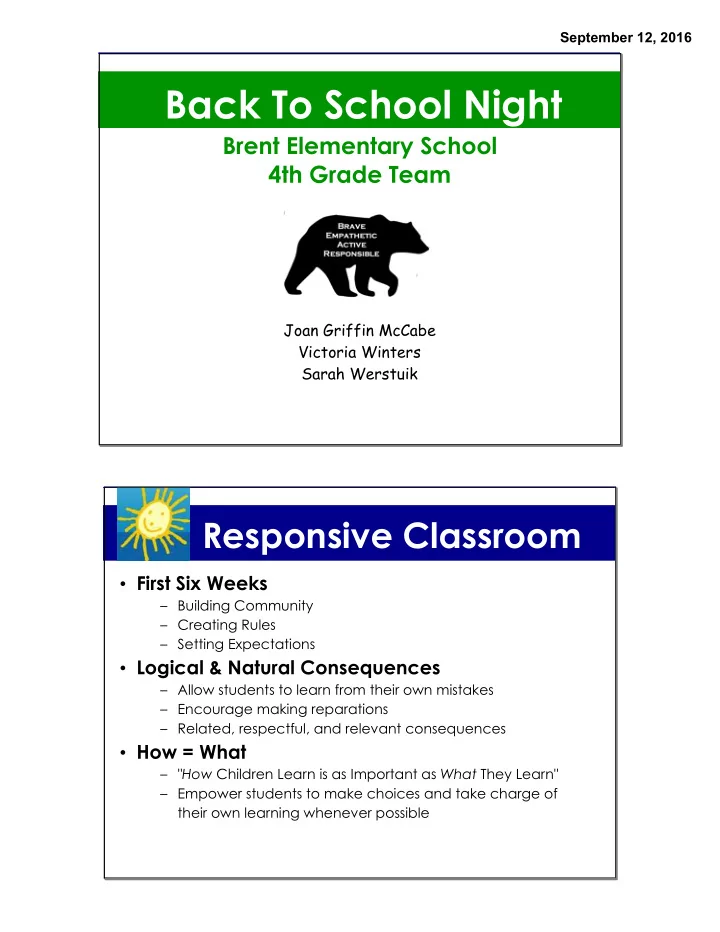

September 12, 2016 Back To School Night Brent Elementary School 4th Grade Team Joan Griffin McCabe Victoria Winters Sarah Werstuik Responsive Classroom • First Six Weeks – Building Community – Creating Rules – Setting Expectations • Logical & Natural Consequences – Allow students to learn from their own mistakes – Encourage making reparations – Related, respectful, and relevant consequences • How = What – "How Children Learn is as Important as What They Learn" – Empower students to make choices and take charge of their own learning whenever possible
September 12, 2016 Morning Meeting • Greeting: Share your name and your 4th grader's name • Share: Joan, Victoria, and Sarah • Activity: How many years has your family been at Brent? • Message: What to expect from 4th grade? a t h w i y d a y e r v e g i n e b W e d n a e w v i r e y a r i n p l s c i d i i - l t m u , r e f o e e r T h . n g t i e e M g i n r n M o a t t h t a n r t o m p i r y v e s t i i e ! m t i o n e i v r r a e n d r i l c h Writing Workshop Process Oriented Writing “ During the writing workshop, students are invited to live, work and learn as • writers. They learn to observe their lives and the world around them while collecting, drafting, revising, editing, and publishing well-crafted narrative and expository texts .” - TCWRP Evidence Based Writing Written in response to a prompt or question. • Draws information from a source to support ideas and involves citing • specific evidence and using reasoning Used in the content areas (Science & Social Studies), during Reader's • Workshop, and in students' at-home journals. On-Demand Writing Gives students an opportunity to quickly demonstrate strategies and • techniques they have learned Helps teachers assess growth and plan for upcoming instruction • Helps develop (and gauge) stamina •
September 12, 2016 Reading Workshop Principles of Reading Instruction Children are the "bosses" of their own reading lives. • – We teach them to be accountable for their choices about what to read, when to read, and for how long. Children can only grow as readers by having repeated experiences of • reading success. – We want them to consume a lot of literature at their "just right" level. – Vertical alignment of skills builds off previously acquired skills Children strengthen their skills as readers by analyzing and discussing the • work of skilled authors and using mentor texts. – We use "anchor texts" to model the skills we want them to use in their own reading. Talking about our reading (and writing) is an essential part of the learning • process. – Working with Partners, Book Clubs, and Research Teams encourages students to analyze, evaluate, and infer meaning from the texts they read. Math Instruction Investigations Math • Emphasizes reasoning about mathematical ideas • Constructing viable defenses for their answers and critiquing the reasoning of others • Content and fluency is grounded in meaning - not rote memorization Eureka Math • A comprehensive math curriculum created to meet the needs of Common Core shifts • Vertically aligned to build on skills developed in previous grades • Incorporates structured fluency practice with modules grounded in conceptual work with place value. We will "close out" our experience with Investigations and transition fully to Eureka in the Spring.
September 12, 2016 Social Studies Topics • The First Americans (pre 1500) • The "Age of Exploration" (1500-1700) • Settling the Colonies (1700s) • Causes of the Revolution (late 1700s) • The Revolutionary War (1763-1783) • Growing a New Nation (1770s and 1780s) Instruction and Assessment • Resources: Primary Sources, Textbook, Online resources, Supplementary documents, Field Experiences • Chapter Tests • Writing Connections Special Classes Our Special schedule will rotate quarterly. Every quarter students will have these 45-minute Specials: Music (Mr. Krohn) Art (Ms. Gibson) Spanish (Ms. Marchese) Science (Mr. Mangiaracina) P.E. (Coach Mitchell) Library / Typing (Ms. Bettina)
September 12, 2016 Field Experiences In the past, fourth graders have visited the: • National Museum of the American Indian as an extension to our study of Native Americans • Newseum as a component of our Journalism Writing Unit • Claude Moore Colonial Farm as an extension of our study of Colonial America • Mount Vernon as an introduction to our American Revolution Study • Bladensburg Waterfront Park as the culmination of our work with Anacostia River We have a maximum 1:6 chaperone to student ratio for our trips! Homework Homework is assigned nightly 4 nights per week: * In addition to nightly homework, students may also need to study additional material (such as multiplication facts, vocabulary or spelling words, or Social Studies information) leading up to quizzes or tests.
September 12, 2016 Questions? brentelementary.org/site/grade4 brentfourthgraders@gmail.com joan.mccabe@dc.gov victoria.winters@dc.gov sarah.werstuik@dc.gov
Recommend
More recommend